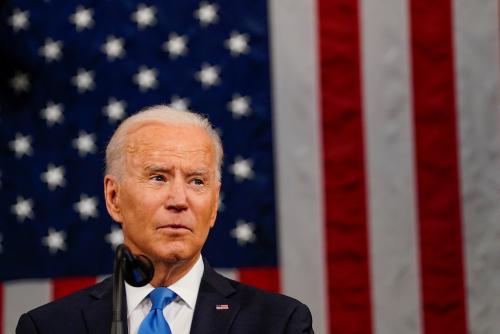Biden was not legally bound to remove all U.S. troops from Afghanistan by May 2021, as the February 29 agreement stipulated. Nor is he bound by any other date. Those were goals, not solemn promises or legal obligations, writes Michael O’Hanlon. This piece first appeared in The National Interest.
Apparently, President Joe Biden feels under pressure to complete the troop-assisted evacuation of Americans, and modest numbers of friends of America, from Afghanistan by August 31. The Taliban has declared that the date represents a “red line.” But the very fact that it has used such language reinforces the importance of not being bound by such an artificial and meaningless deadline. So, of course, do the tens of thousands of Afghans still at risk, and perhaps some Americans that we have not yet found as well — people who would, with their families, very much like to leave rather than trust the promises of amnesty from a supposedly kinder and gentler Taliban.
Biden seems to feel obligated to honor his promise to get U.S. forces out of the country by the end of the month. In reflecting on his options, however, Biden should remember that the Taliban has violated the February 29, 2020, agreement with the Trump administration in two major ways — and continues to do so. The first, the requirement that it break ties with al-Qaida, has been consistently ignored — as demonstrated by the presence of high-ranking Haqqani network figures within Taliban leadership, and as documented by the United Nations in reports issued earlier this year. The second, the demand that the Taliban engage seriously in peace talks with the Ghani government and other Afghans to create a roadmap for power-sharing was never taken seriously.
As such, Biden was not legally bound to remove all U.S. troops from Afghanistan by May 2021, as the February 29 agreement stipulated. Nor is he bound by any other date. Those were goals, not solemn promises or legal obligations. Moreover, we did not ask for permission to send several thousand troops back to Afghanistan this month; why should we ask permission for them to finish their job?
To kowtow to Taliban demands that we satisfy this latest promise from Washington, lest we risk attacks against our fellow citizens or allies, would be to concede a kind of moral high ground to an outlaw and murderous (and drug-dealing) group that has been killing thousands of innocent Afghans a year for decades.
Moreover, to do so would ignore the leverage we still have over the Taliban:
First, we know the locations of the government offices and headquarters where its leaders seek to rule the country; if the Taliban targets Americans or its friends, we have many options for direct retaliation.
Second, we and our friends and allies control the possibility of diplomatic recognition of the group by the preponderance of the world’s nations.
Third, we control access to most of the financial assets of Afghanistan in general and Taliban leadership in particular.
Fourth, together with NATO allies, Japan, and others, we control the pursestrings of the foreign assistance that Taliban leaders — accustomed by now to the good life in Peshawar, Quetta, and Doha — want more than they may admit.
None of this is to suggest confrontation for its own sake. We have an interest in encouraging Taliban restraint in how it treats our friends, women, minorities, political reformers, and advocates for human rights. And the premature announcement of a firm intention to stay past August 31 risks unnecessary Taliban violence against those still trapped in the country.
But it would be a major mistake to forget how much leverage we retain, in the form of both carrots and sticks. Staying an extra 10 or 20 or 30 days — or whatever we deem necessary in the end — is not only the right thing to do by way of honoring and protecting our brave friends and allies. It is what is now needed to begin the process of restoring American credibility, not only in the eyes of the Taliban but the rest of the world, as the Biden administration attempts to regain its sea legs after an absolutely terrible month.









Commentary
Joe Biden must ignore the Taliban’s August 31 withdrawal “red line”
August 25, 2021